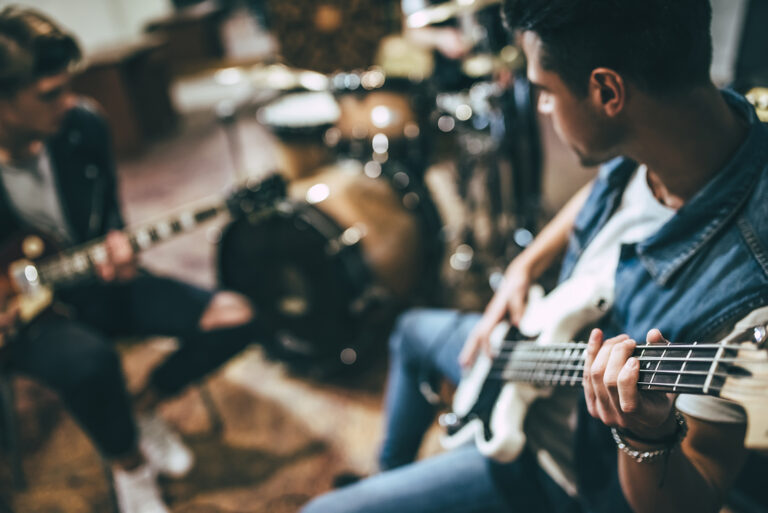
The ongoing pandemic has dramatically altered the ways in which artists are able to collaborate with their fellow songwriters and producers, in some cases driving former creative loners to seek out the human interaction in the form of collaboration.
Here, I want to break down some dos and don’ts for collaborating as efficiently as possible.
With the pandemic re-defining the rules of collaborations in the music industry, it can be tough to assess how to utilize your time wisely.
Many musicians love collaborating with other songwriters and producers. Some artists have just found themselves in need to collaborate more often due to lack of human interaction in the recent months.
Regardless of which category you might fall under, as an artist, you should set your priorities straight before you take on a collaborative project.
Collaborating Remotely
When it comes to remote collaborations, every musician has their own preferred method.
Some enjoy working on their ideas in private and exchanging drafts with their peers without scheduling a single phone call.
Others treat video conference calls like in-person co-write sessions.
For most songwriters, artists and producers, a healthy combination of both strategies works best.
Set up a meeting to discuss rough ideas before you get started.
If you set up a meeting to discuss rough ideas, everyone involved is more likely to be on the same page from the get-go.
Video conference calls are especially ideal for exchanging lyrical and melodic starters, as well as determining the structure, key, tempo and general mood of the song.
Make a decision about who does what first.
Regardless of how many songwriters and producers are involved with the project, there should be a specific order of events that you determine as you go.
Having every musician work on the project in private simultaneously could lead to an interesting experiment. But in most cases, taking turns is the most efficient way to approach remote collaborations.
For instance, if you have lyrical and melodic ideas first, you can take some time to record more concrete verse, chorus and bridge sections in private, and exchange demos with your fellow songwriters before getting the producers involved.
Another option in such a case could be showing what ideas you have so far to the producer, who will then build a track around them, so that the songwriters involved with the project can top line it.
Take some time to mull things over.
The best part of remote collaborations is the fact that everyone gets a chance to work on their own at some point.
It’s often really difficult to reach a flow state level of focus in groups, but if you’re alone in your studio or a familiar room, you might unleash a much more intense type of creative energy.
Remote collaborations will also help you better observe how you collaborate best and understand your strengths and weaknesses.
Collaborating In Person
One of the biggest challenges of collaborating in person is overcoming your insecurities as a musician.
I’ve met many songwriters, producers and artists who struggle to be in the moment when it comes to creating with others, even after garnering years of experience in their field.
Anxiety and personal insecurities tend to be deeply rooted issues to overcome. But walking into co-write sessions unprepared will only make those issues more difficult to cope with.
If you’re an artist, you should be prepared to set the tone.
As the person who’s going to record the song, it’s your responsibility to lead your team to focus on a specific theme.
Before the session, contemplate what’s been on your mind lately, whether it’s a dream, memory or experience you can’t seem to forget or get over.
If you’re a songwriter, create a collection of lyrical, melodic and harmonic snippets.
There are many artists who want to get involved with the writing process of the songs they record, but don’t have the tools to get their ideas out. That’s where songwriters come in.
Having short clips and demos of catchy melodies and chord progressions you feel inspired by, as well as a notebook filled with potential lyrics with you during the session, will help you feel more confident as the mediator.
If you’re a music producer, your biggest priority should be to organize your sample packs, presets and kits before the session.
The producer in a co-write session is usually responsible for composing the instrumental track almost single-handedly.
Making such a thing happen in real time while the songwriting process continues in the background can be stressful, especially for those who are relatively inexperienced in their field.
But regardless of your level as a producer, making sure that your tools are organized and ready to go can only help. Imagine looking for the right kick or snare samples for half an hour in front of your collaborators when you should be putting together a beat instead… It doesn’t sound very productive now, does it?
It is often encouraged to start writing a song from scratch in co-write sessions. But that doesn’t mean you should go into it with the hope that inspiration will magically find you.
Sessions that take too long usually end up being unproductive. Perhaps it sounds like fun to chit-chat for a couple of hours before you get started, but the longer you sit in a room together, the more tired you will be. Inevitably, the product will reflect the energy of the creative process that conceived it.
The key is to reach the peak of productivity sooner rather than later, even if you set aside a whole day for a co-write session.








